Filter by

Credit and Trade in Later Medieval England, 1353-1532
This book challenges the notion that economic crises are modern phenomena through its exploration of the tumultuous 'credit-crunch' of the later Middle Ages. It illustrates clearly how influences such as the Black Death, inter-European warfare, climate change and a bullion famine occasioned severe and prolonged economic decline across fifteenth century England. Early chapters discuss trends in …
- Edition
- 1
- ISBN/ISSN
- 9781137489876
- Collation
- XV, 277
- Series Title
- Palgrave Studies in the History of Finance
- Call Number
- 657

The Routledge Handbook of Taxation and Philanthropy
The Routledge Handbook of Taxation and Philanthropy ventures into a territory that is still widely unexplored. It contains 30 academic contributions that aim to provide a better understanding of whether, why, and how philanthropic initiatives, understood as voluntary contributions for the common good, can and should be fostered by states through tax incentives. The topic has been addressed from…
- Edition
- -
- ISBN/ISSN
- 9781000514216
- Collation
- -
- Series Title
- -
- Call Number
- 330 ROU r
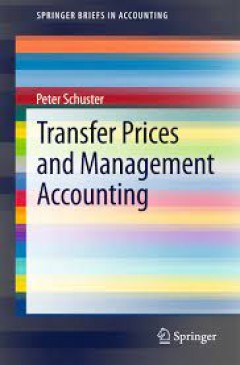
Transfer Prices and Management Accounting
Transfer prices are of dominant importance in company practice and a decentralised organisation, e.g. a profit centre-organisation, is most-widely used. This textbook takes an innovative controversial approach by looking at functions of transfer prices and how different types of transfer prices can fulfil them. Suggestions common in other textbooks will be picked up and it will be shown why the…
- Edition
- -
- ISBN/ISSN
- 978-3-319-14750-5
- Collation
- -
- Series Title
- -
- Call Number
- -
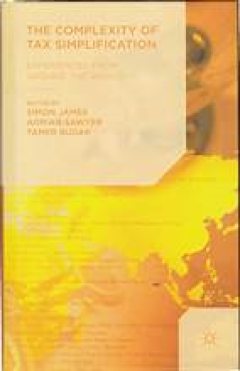
The Complexity of Tax Simplification
Simplicity in taxation has considerable potential advantages. However, attempts to simplify tax systems are only likely to be successful and enduring if they take account of the reasons why taxation is complex. There are strong pressures on tax systems to accommodate a range of important factors, as well as complex and changing national and international environments within which modern tax sys…
- Edition
- 1
- ISBN/ISSN
- 978-1-137-47869-6
- Collation
- XIV, 273
- Series Title
- -
- Call Number
- -
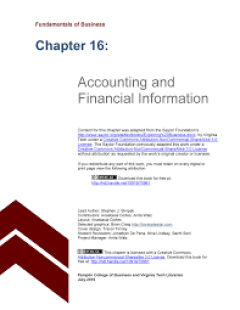
Accounting and Financial Information
Accounting is often called “the language of business” because it communicates so much of the information that owners, managers, and investors need to evaluate a company’s financial performance. These people are stakeholders in the business—they’re interested in its activities because they’re affected by them. The financial futures of owners and other investors may depend heavily on …
- Edition
- -
- ISBN/ISSN
- -
- Collation
- -
- Series Title
- -
- Call Number
- 330

Pension Finance and Management
This open textbook is a living document of knowledge and skills needed by finance students and professionals to design, govern, and invest financial resources from savings set aside during the working years, either by law (e.g., Canada Pension Plan), by mutual agreement (e.g. occupational pension plan), or privately (e.g. Registered Retirement Savings Plan, Tax-Free Savings Plan). Saving for re…
- Edition
- -
- ISBN/ISSN
- -
- Collation
- -
- Series Title
- -
- Call Number
- 332 FUJ p
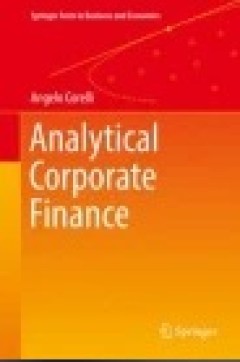
Analytical Corporate Finance
This book draws readers’ attention to the financial aspects of daily life at a corporation by combining a robust mathematical setting and the explanation and derivation of the most popular models of the firm. Intended for third-year undergraduate students of business finance, quantitative finance, and financial mathematics, as well as first-year postgraduate students, it is based on the twin …
- Edition
- Ed. 1
- ISBN/ISSN
- 978-3-319-39549-4
- Collation
- XVIII, 471
- Series Title
- Springer Texts in Business and Economics
- Call Number
- 657.48 COR a

The Influence of Information Order Effects and Trait Professional Skepticism …
Kristina Yankova addresses the question of what role professional skepticism plays in the context of cognitive biases (the so-called information order effects) in auditor judgment. Professional skepticism is a fundamental concept in auditing. Despite its immense importance to audit practice and the voluminous literature on this issue, professional skepticism is a topic which still involves more…
- Edition
- -
- ISBN/ISSN
- 978-3-658-08871-2
- Collation
- XXVI, 302
- Series Title
- Auditing and Accounting Studies
- Call Number
- -

Standards for Enterprise Management Control
This book is mainly about facilitating the dissemination of management control, a field now finding application at a growing number of organizations, among commercial practitioners. It provides essential insights on management control as applied to Chinese enterprises and cross-border organizations. The book is divided into four parts. Part 1 provides the necessary background and framework for …
- Edition
- -
- ISBN/ISSN
- 978-3662457832
- Collation
- -
- Series Title
- -
- Call Number
- -
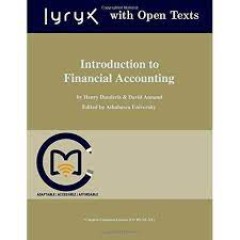
Introduction to Financial Accounting
Accounng involves a process of collecng, recording, and reporng a business’s economic acvies to users. It is oen called the language of business because it uses a unique vocabulary to communicate informaon to decision makers. To understand accounng, we first look at the basic forms of business organizaons. The concepts and principles that provide the foundaon for financial accounng are the…
- Edition
- -
- ISBN/ISSN
- -
- Collation
- -
- Series Title
- -
- Call Number
- 330 DAU i
 Computer Science, Information & General Works
Computer Science, Information & General Works  Philosophy & Psychology
Philosophy & Psychology  Religion
Religion  Social Sciences
Social Sciences  Language
Language  Pure Science
Pure Science  Applied Sciences
Applied Sciences  Art & Recreation
Art & Recreation  Literature
Literature  History & Geography
History & Geography